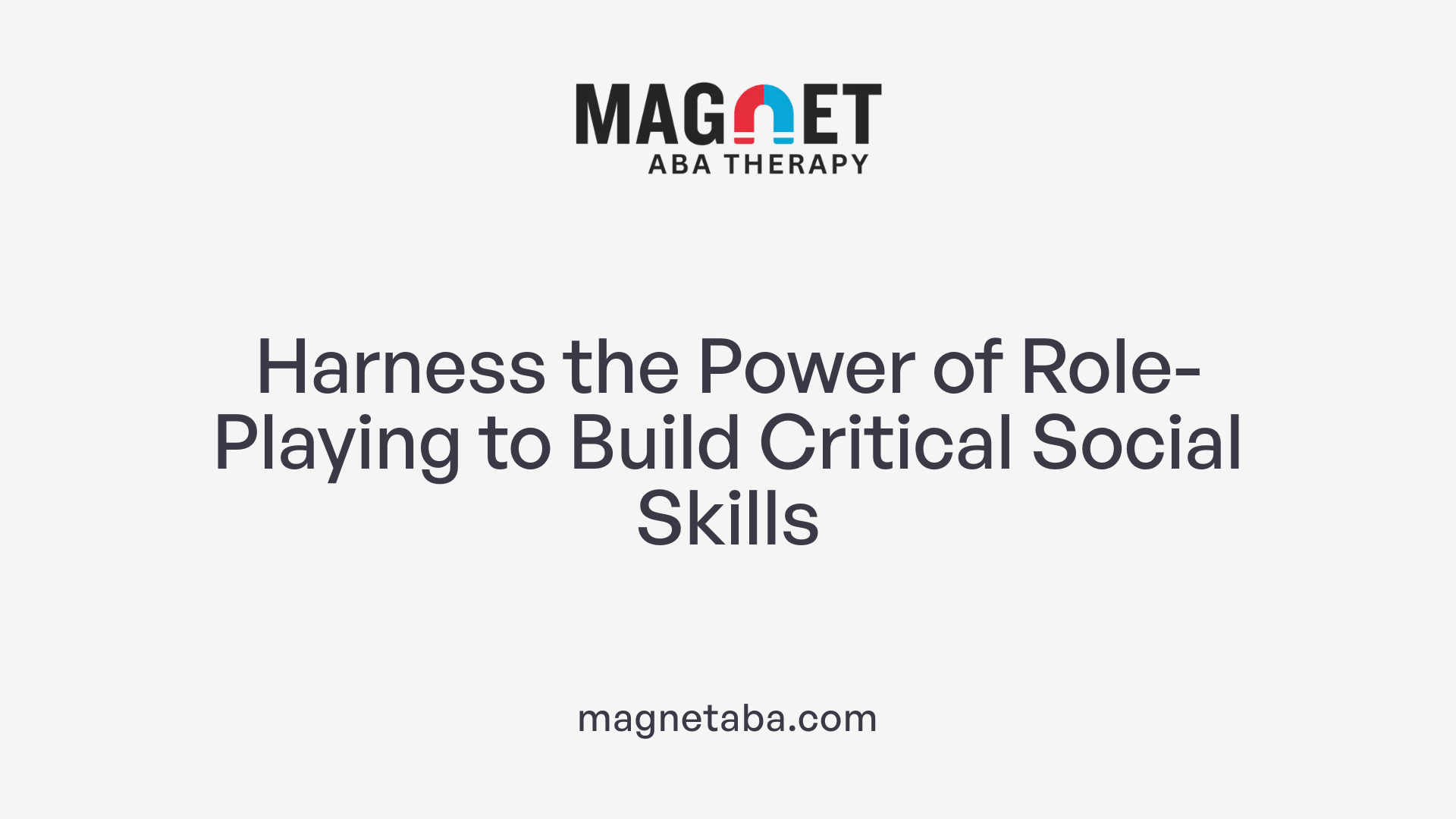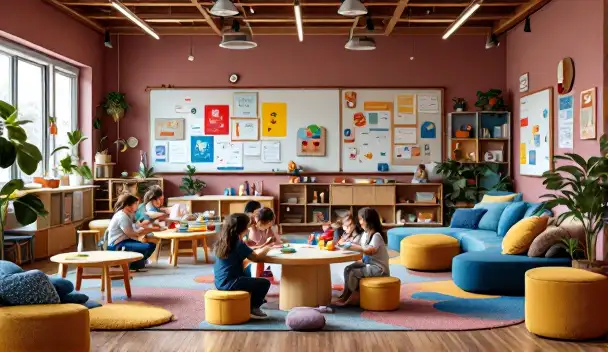Harnessing the Power of Play in Social Education
In educational settings, fostering social skills is essential for students’ overall development and future success. One highly effective technique that promotes active learning and empathy is role-playing. This method allows students to practice and refine essential interpersonal skills in a safe, engaging environment. Particularly beneficial for middle schoolers, including those with disabilities or differing learning styles, role-playing simulates real-life social situations to enhance understanding, communication, and social competence.
Role-Playing as a Dynamic Tool for Social Skill Development

How does role-playing support social skill development in educational settings?
Role-playing is a highly effective method for enhancing social skills among middle school students, especially those who learn and think differently. It creates a safe and engaging environment where students can practice key interpersonal skills such as communication, empathy, and conflict resolution. Through acting out real-life scenarios, children learn to recognize and interpret social cues, express their thoughts clearly, and manage their emotions appropriately.
This approach encourages perspective-taking by allowing students to see situations from others’ viewpoints, fostering understanding and compassion. For example, children who practice accepting criticism or giving compliments develop a better understanding of social norms and expectations.
Role-playing also prepares students for real-world interactions like teamwork, negotiations, and interviews. When activities are well-facilitated, they can motivate students, boost their confidence, and improve their ability to form positive relationships. It helps them understand diverse social norms and adapt to different situations, which is especially important for students with disabilities or social difficulties.
What are some practical approaches to implementing role-playing in social skills instruction?
Incorporating role-playing into social skills teaching requires thoughtful planning and execution. A practical approach involves designing scenarios that are realistic, relevant, and spontaneous to simulate everyday social interactions. These scenarios should focus on positive behaviors, such as greeting others, making eye contact, or resolving conflicts.
Teachers can start with simple, non-graded exercises to build comfort, gradually moving to more complex situations, including those that may involve conflict or social challenges. Providing clear instructions and defining the objectives of each role-play helps students understand what skills they are practicing.
Peer observation and feedback are valuable tools, encouraging students to reflect on their actions and learn from each other. Debriefing sessions are essential for reinforcing lessons and discussing emotional and social responses.
Using scripted scenarios or well-structured activities allows students to practice specific skills like assertiveness, negotiation, and empathy. Group or pair activities promote collaboration and help students navigate diverse social dynamics.
Additionally, encouraging self-monitoring enables students to evaluate their own social behaviors in real-world or simulated contexts, fostering ongoing growth. By creating a supportive atmosphere and providing specific, goal-oriented exercises, educators can help students develop essential social skills through role-playing.
Strategies for Successful Role-Playing Implementation

Techniques for teaching social awareness through role-playing
Effective role-playing for teaching social awareness involves designing scenarios that are realistic and relevant to students' everyday experiences. This approach ensures students are more engaged and see the practical value of the activities. Teachers should establish clear learning objectives for each session and provide guidance on how students should participate. Keeping role-plays brief and focused makes the process manageable and prevents fatigue.
During the activity, educators observe students' interactions closely, offering immediate and constructive feedback on verbal exchanges, body language, and emotional responses. Such feedback helps students understand what behaviors are effective and which need improvement. After the role-play, reflection questions encourage students to analyze their performance, understand others' perspectives, and think about alternative strategies. Creating a safe environment where students feel comfortable taking risks, modeling positive behaviors, and ensuring these exercises connect with real-life situations further improves the likelihood that skills will transfer outside the classroom.
Methods for teaching social awareness through role-playing
To foster social awareness, facilitators should craft scenarios that enable students to recognize social cues, interpret body language, and understand others' emotions. Guided reflection during and after role-playing helps students identify how their actions influence others and develop empathy. For example, students can practice interpreting facial expressions, tone of voice, or gestures to better grasp social cues.
Providing feedback that highlights strengths and suggests improvements encourages self-awareness and empathy. Linking role-playing activities to broader skills like teamwork, conflict resolution, and problem-solving reinforces the utility of these skills in diverse social settings. Post-activity discussions and debriefings deepen understanding by exploring feelings involved, alternative responses, and social norms. This comprehensive approach makes role-playing an engaging way to develop nuanced social awareness important for fostering inclusive and respectful peer interactions.
Research Evidence Supporting the Use of Role-Playing in Social Skills Education

What research exists on the effectiveness of role-playing in teaching social skills?
Numerous studies and reviews confirm that role-playing is a powerful tool for improving social skills in various settings. In schools, role-playing activities have been shown to foster better communication, empathy, and self-awareness among students. When children practice social scenarios like giving compliments or resolving conflicts through role-play, they build confidence and learn to navigate real-life interactions more effectively.
Research highlights that structured role-playing exercises, especially when combined with feedback and reflection, lead to meaningful improvements in social competence. Teachers and caregivers who rehearse social situations with children can help them recognize social cues, understand different perspectives, and respond appropriately.
In addition to educational settings, evidence from medical training indicates that scenario-based role-playing enhances communication with patients, teamwork, and emotional regulation. Medical students report feeling more prepared to handle difficult conversations after practicing through role-plays.
A comprehensive review of the literature points out that role-playing benefits include increased motivation, engagement, and the development of critical skills such as negotiation, cooperation, and conflict resolution. It also allows children to experience and learn from both successful and challenging interactions in a safe environment.
Overall, the research supports using role-playing as a versatile, effective method to teach social skills, especially for children who learn and think differently, including those with learning disabilities or social challenges. By regularly practicing these skills, children can transfer what they learn to everyday situations, contributing to their social and emotional growth.
| Setting | Main Benefits | Supporting Evidence | Additional Notes |
|---|---|---|---|
| Schools | Improves communication, empathy, self-awareness | Empirical studies; SEL programs demonstrate positive impacts | Useful for broad age range |
| Medical training | Enhances patient interaction and teamwork | Clinical research; improved patient-provider communication | Applies to health education |
| Therapy and social work | Fosters emotional regulation and conflict management | Therapeutic case studies; behavioral improvements | Tailored scenarios enhance learning |
| Community programs | Promotes inclusion, diversity awareness | Evidence from community-based interventions | Encourages real-world interaction |
This body of evidence underscores that role-playing not only helps children practice social skills but also enhances their ability to understand others and behave compassionately. Its proven effectiveness across various domains makes it a valuable method for equipping young learners with the social tools they need to succeed.
Adapting Role-Playing for Diverse Learners and Populations

How can role-playing be adapted for different populations, including students with disabilities?
Role-playing is a versatile activity that can be tailored to meet the unique needs of students with disabilities and other diverse learners. The goal is to create inclusive environments where every student can develop social skills and build confidence.
For children with learning disabilities, autism, or other special needs, customized scenarios are essential. Educators and caregivers can incorporate visual aids such as picture cards or visual cue systems to reinforce understanding of social cues and expected behaviors. Scripts or prompts can also be used to guide students through social situations step-by-step.
Technology can play a supportive role. Assistive devices, including apps tailored for social skills training or recording tools, allow students to review and reflect on their interactions. This can deepen learning and assist in practicing responses at their own pace.
Incorporating exaggerated gestures, movement, or role reversal strategies can be particularly effective for children with autism or those who learn better through physical activity. These techniques help make social cues clearer and more accessible.
Creating a supportive, low-pressure environment is vital. Teachers should be mindful of individual emotional states and provide encouragement to boost confidence. Making activities playful and non-judgmental fosters a positive attitude toward social learning.
Ultimately, adapting role-playing activities involves understanding each student's abilities and tailoring scenarios accordingly. This approach helps learners practice essential social skills like greeting others, making eye contact, resolving conflicts, and joining group activities—all while feeling supported and capable.
Fostering Lifelong Social Competence Through Role-Play
Role-playing stands out as a versatile and effective approach to teaching social skills across diverse educational settings. By providing a simulated yet safe environment for students to explore social interactions, it not only improves communication, empathy, and problem-solving abilities but also builds confidence and inclusivity. When tailored appropriately to meet the needs of all learners and supported by research, role-playing becomes a powerful tool that prepares students for real-world social challenges. Embracing this dynamic technique can foster lifelong social competence, empathy, and community-mindedness, ultimately enriching students’ personal and professional lives.
References
- 8 social situations to role-play with your middle-schooler
- Social Skills RP Scenarios | thecognitivecoach
- Social Awareness Role Playing Activity
- Role-Playing Scenarios
- Social skills instruction – Supporting Positive Behaviour
- Role Playing | Center for Innovative Teaching and Learning
- Role Playing Helps Develop Social Skills
- Social skills instruction – Supporting Positive Behaviour
- Social Awareness Role Playing Activity












